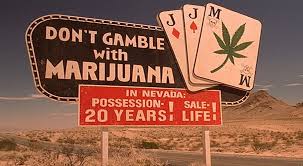
Nevada was depicted in Fear and Loathing in Las Vegas as a harshly repressive place for anyone with an interest in cognitive liberty. As captured in the foul year of our Lord, 1971, the billboard welcoming drivers to Nevada warned of 20 years imprisonment for being caught in possession of “marijuana”. Fast forward to July 2017, and they have recreational cannabis legally on sale in shops. This article looks at what we could learn from them.
Colorado passed a referendum legalising cannabis five years ago, and the results were more or less exactly what cannabis law reform activists had predicted the entire time. Now there are eight American states that allow legal recreational cannabis use, making it all the more pathetic that New Zealand politicians have so far lacked the courage to even discuss the issue.
Nevada is the most recent of these. Recreational cannabis sales became legal in Nevada this July. This first month of legal sales generated $US27.1 million in receipts, about $40 million in New Zealand dollars.
Much of that $40 million is believed to be from tourists who came into Nevada for the sake of their legal cannabis. It was almost double what Colorado sold in the first month of legal recreational sales there, and if one considers that the population of Nevada is 60% that of Colorado it’s three times the amount per capita, so clearly this isn’t all just coming from local demand.
What that tells us is that, with eight American states now with some form of recreational cannabis sales, New Zealand’s edge in the tourist market is rapidly bluntening. In much the same way that Islamic theocracies like Iran and Saudi Arabia that suppress alcohol don’t get many tourists, neither will New Zealand get many tourists when we’re the last ones to legalise recreational cannabis.
At the very least, we need to get the jump on Australia. If Australia, or even one of the major tourist states (Queensland, New South Wales or Victoria), would legalise recreational cannabis it would have a devastating impact on New Zealand’s place in the backpacker circuit.
On the other hand, if we legalised recreational cannabis sales while Australia was still struggling with gay marriage, we could capture a decent sector of the international tourist market. If it were possible to visit cannabis cafes on the main streets of places like Levin and Ashburton (let alone the bigger places) then Australia would start to look like a backwater in comparison.
$40 million in the first month of sales suggests around half a billion dollars a year in recreational cannabis sales for Nevada alone. This equates to some 5-10,000 full-time jobs. On a per capita basis, such a policy might provide 8-16,000 full-time jobs in New Zealand (this is in line with job figures suggested by Waikato cannabis kingpin John Lord).
Of course, Nevada voted to have legal medicinal cannabis in 2000, and New Zealanders haven’t even been allowed to have that yet, so the worry is that if we’re 20 years behind in that regard we will be 20 years behind when it comes to recreational law reform as well, i.e. Kiwis can expect to be allowed to buy a few grams of cannabis and use it like they would alcohol sometime in the mid 2030s.
But what we can tell from the short experience with legal recreational cannabis sales in Nevada is that the process has more or less gone the same way as in Colorado and Washington: no spike in crimes, tens of thousands more white market jobs, a lot more money for schools, and a whole lot of sheepish-looking prohibitionists.
